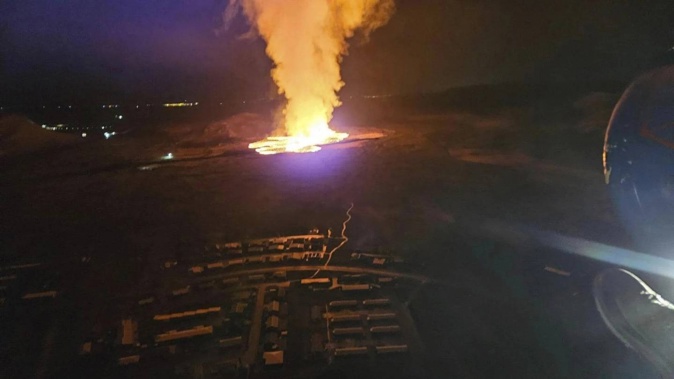
Dramatic images of houses engulfed in lava and a second volcano eruption have travellers asking if they should cancel trips to Iceland.
Grindavik residents were told to evacuate shortly before 8am on Sunday, after new fissures began spewing molten magma.
This latest eruption at the Fagradalsfjall volcano, south of the capital Reykjavik on the Reykjanes peninsula, comes just three weeks after warnings and a first eruption stirred locals. Despite almost a month of preparation of defences, this new lava flow has caused several houses to ignite and has closed infrastructure across the southwest of the island.
Nearby tourist attractions including the Blue Lagoon pools have been closed this weekend. The eruption’s proximity to Keflavik, Iceland’s main international airport has also seen some travellers rethinking their plans.
/cloudfront-ap-southeast-2.images.arcpublishing.com/nzme/H5UKQGG2WRCIFD4GLCAK6DC7WY.jpg) Iceland tourists are being told to avoid the area and attractions have been closed by the new volcano. Photo / Marco di Marco, AP
Iceland tourists are being told to avoid the area and attractions have been closed by the new volcano. Photo / Marco di Marco, AP
Icelandic president Guðni Jóhannesson was quick to say that residents were safe but to expect local disruption.
“No lives are in danger,” he wrote on social media, but warned “infrastructure may be under threat”. The president also added that flights into the airport had not been affected and international travel continued as normal.
Is it safe to travel to Iceland?
New Zealand’s Ministry for Trade and Travel does not issue travel advisories for Iceland. The nearest embassy is in Stockholm, Sweden, but travellers are still advised to register travel through Iceland on the MFAT website.
However other official travel advisories have issued fresh advice on the Grindavik eruptions.
The UK Foreign Office says Reykjavik and the rest of Iceland remain largely unaffected but tourists are advised to follow local advice and media updates.
“All roads to Grindavík are closed and you should stay away from the area. Keflavik International Airport is operating as normal, but you should check for latest updates.”
Are Iceland flights affected by the volcano?
Icelandic airports body Isavia which operates Keflavik International Airport says flights are generally unaffected by the eruption.
The website has an alert regarding the Reykjanesskagi eruption, but advises travellers to check the Civil Protection Department or Meteorological Office for the latest updates.
Volcanoes have the potential to cause massive disruption to airspace. In 2010 the Eyjafjallajökull eruption in Iceland caused a complete shutdown of civil aviation across the North Atlantic and Western Europe. Ash and volcanic debris can be a hazard for aircraft.
However, this latest eruption is very different in characteristics and unlikely to produce disruptive ash clouds, with less ice and meltwater present.
/cloudfront-ap-southeast-2.images.arcpublishing.com/nzme/X2EIFHFU7BVPLO32JR2E3KMYZQ.jpg) The Blue Lagoon pools on the Reykjanes Peninsula have been closed by the eruption. Photo / Susan Buckland
The Blue Lagoon pools on the Reykjanes Peninsula have been closed by the eruption. Photo / Susan Buckland
Arrivals are unaffected, but tourists travelling through Iceland are advised that some infrastructure and attractions will be closed.
The Blue Lagoon, which is also located on the Reykjanesskagi, has closed over fears of increased seismic activity. The famously photogenic geothermal spa says guests wishing to cancel or postpone visits can do so online.
“All guests with bookings during this temporary closure period will be contacted,” said a statement from the pools.
/cloudfront-ap-southeast-2.images.arcpublishing.com/nzme/QPDFW4S5RBFQDKVQA22Z4QGPEM.jpg) Police have asked tourists not to go photo-hunting near the eruptions in Grindavík. Photo / Marco di Marco, AP
Police have asked tourists not to go photo-hunting near the eruptions in Grindavík. Photo / Marco di Marco, AP
The Suðurnes region around the eruption is well known for hiking and stunning landscapes. However tourists have been advised to keep away from the eruption.
Icelandic police issued a warning that there were many hazards present in the eruption zone, beyond the spectacular lava flows.
“The area is dangerous both in terms of cracks, gas and more,” said an update on the police Facebook page.
Photo hunters were warned not to go looking for magma flows in the area, adding that emergency personnel would struggle to get to the scene.
Take your Radio, Podcasts and Music with you









